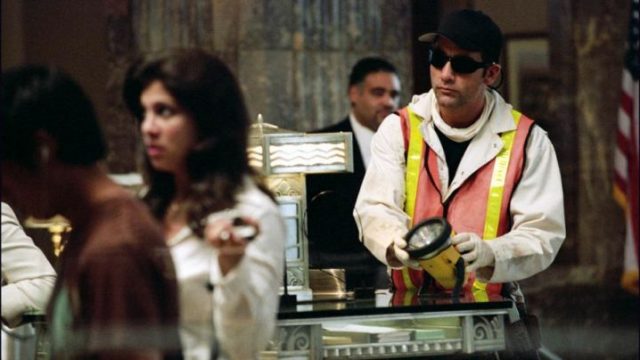Spike Lee’s exuberant, cleverly crafted heist film is inventive and indulgent in the best possible way, like an HBO miniseries crammed into a deliciously jam-packed 129 minutes. Lee is interested in giving the widest, most polyphonic view of the situation–our own Grant Nebel has talked before about Spike Lee as, specifically, a New York filmmaker, and here we have Spike Lee’s New York in all its smart, florid, grimy, scheming glory, not just cops and criminals but political fixers, not just the money in the bank but the money earned decades ago, not just present crimes but past sins. (And present, mostly unremarked-upon sins: one of the nicely handled background details is the casual racism and brutality of the NYPD, which is just one more factor to be dealt with in a complex situation.) Our leads are Clive Owen, in a stripped-down and mostly-masked performance as the heist’s ringleader; Denzel Washington as a sharp and ambitious detective; and Jodie Foster as a coolly elegant political fixer who, courtesy of the bank’s chairman of the board, gets pulled into managing the robbery from an unusual angle.
Lee and screenwriter Russell Gewirtz fill the movie with cleverness, knowing that one of the main pleasures of heist films is the interplay of process and deception. Clive Owen’s group of bank robbers all call each other some variation of Steve–Stevie, Steve-o, etc.–to create a low-key confusion among the hostages and keep them from being easily separated and labelled; they regularly move hostages around and slip themselves in with them. And all the while, they’re doing some unexplained construction process. The other side of the equation is firing on all cylinders, too: they specifically choose to send in pizzas when food is requested, not sandwiches. Why? Pizza boxes are easier to bug.
The movie deploys its surprises so well that it would be a shame to spoil them … but it would also be a shame to present it as a movie just about surprises, about twists and turns that fall apart the moment you walk away from the screen. It’s also a vivid portrait of New York, a look at professionals doing what they do best, and a reckoning of the past and the present. With all of that to offer, Lee’s most unabashed genre film makes for great viewing.

